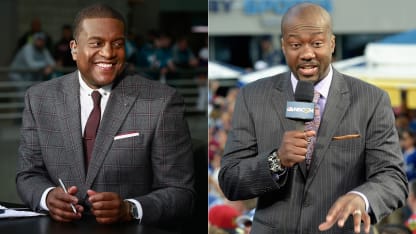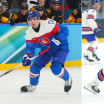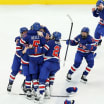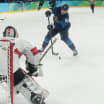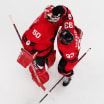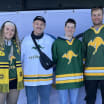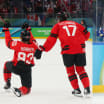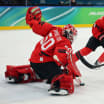On the local level, former forward Jamal Mayers has provided perspective during Chicago Blackhawks telecasts on NBC Sports Chicago for the past seven seasons after a stint on NHL Network, former Devils captain Bryce Salvador is in his third season as an analyst for MSG Networks, former defenseman Jean-Luc Grand-Pierre is in his first season working Blue Jackets games for Fox Sports Ohio and former forward Anthony Stewart is on Hockey Central on Sportsnet 590 The Fan in Toronto.
Mayers, Salvador and Grand-Pierre said they're aware of the trailblazing nature of their jobs, just as they were when they were playing in the NHL.
"Because when you are one of the first doing anything you are going to feel that pressure to do well, not only selfishly but also for all the aspiring kids behind you to do the same," said Mayers, who had 219 points (90 goals, 129 assists) in 915 NHL games for the Blackhawks, St. Louis Blues, Calgary Flames, Toronto Maple Leafs and San Jose Sharks. "For players of color, we feel this responsibility that we know what we're talking about, that we're articulate and that we're insightful. We're perhaps judged on a higher scale. I don't take it lightly, so I make sure that I'm aware, prepared and showing nuance."
Salvador said their presence in the studio or between the benches during games is important because it helps "grow the game and bring awareness to the game" in communities of color.
"You add the diversity of my background, being biracial, it opens up potential new doors for viewers to be exposed to the game," said the retired defenseman who had 110 points (24 goals, 86 assists) in 786 games for the Devils and Blues. "We all know that Anson and Weekes have been doing a great job for years, but in the local markets now it's great to see more announcers who are biracial or of ethnic backgrounds representing the game and helping to build in those communities."
But the transition from player to broadcaster hasn't always been easy. Mayers said "it was painful to watch myself that first year because it didn't seem as natural or comfortable" to be in front of the camera. He's more relaxed these days.
"I got some great advice early on at NHL Network that you want to get to the point where you're conversational, that you're like one of their (viewers) buddies talking hockey at the water cooler," he said.
Salvador had to get used to sometimes pointing out on-air mistakes made by some Devils players who were once his teammates, as well as getting used to calling them by their proper names during broadcasts.
"Andy Greene was never Andy Greene to me -- it was 'Greener,'" Salvador said of the veteran defenseman who succeeded him as Devils captain. "It was a big stumbling block. I had to go into my brain somewhere and remember what his first name is."
Grand-Pierre said his first time on-air was more nerve-wracking than his first NHL game.
"I was probably sweating more than after my first NHL game," said Grand-Pierre, who had 20 points (seven goals, 13 assists) in 269 games for the Blue Jackets, Capitals, Buffalo Sabres and Atlanta Thrashers. "The reason for it was that it was something so new, being in front of the camera. You know the spotlight is on you as opposed to being in a team game, being one of five on the ice or 20 on a team."
Mayers said he's sometimes approached by people of color in Chicago who recognize him from television. He uses those encounters to sell the game.
"The fortunate and unfortunate part of our game is it's amazing on TV -- we do our best in production -- but there's nothing like being there, hearing the sounds, seeing how fast our athletes are," he said. "When I meet someone, it's an opportunity to convince them to check out our game, be introduced to the game and become a fan."
